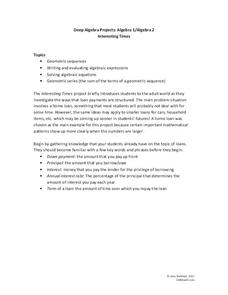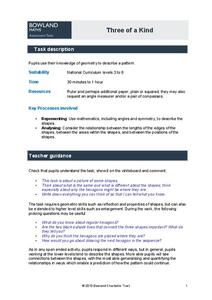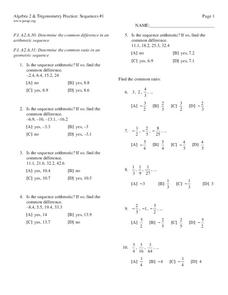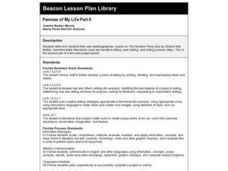Curated OER
S-I-R Model of Disease
For this SIR model worksheet, students use the SIR method to determine the rate of change of people real life problems. They investigate the sequence of people infected with a disease, the number recovered, and the number of susceptible...
Curated OER
Analyzing the S-I-R Model
In this SIR model instructional activity, students analyze a real life problem using the SIR method. They explore given facts and determine the threshold value for an epidemic, the sequence for the recovery period, and the effect on the...
Curated OER
Nasreddin's Visitors: Recreating a Story
In this story recreation worksheet, students choose the correct sentence from 3 given to tell the story, using context clues to put the sentences in the proper sequence.
Curated OER
Time to Look at Me!
Second graders investigate timelines. For this sequencing lesson, 2nd graders create a timeline of events important to their lives and then write a description of the event describing why it is important to their life.
Curated OER
Chain of Events
In this chain of events worksheet, students write the events in the correct sequence inside of pictures of chain links. They draw or write the topic in the middle.
Curated OER
Leafy Lengths
In this length worksheet, learners see the lengths of different leaves and answer word problems about them where they put them in a sequenced order. Students complete 3 problems.
Curated OER
Decimals
In this decimals worksheet, students fill in the missing numbers to the sequences with numbers with decimals. Students complete 5 problems total.
Curated OER
Number Pattern
In this number pattern recognition activity, students connect the dots to create a picture. In this drawing activity, students connect thirty-four dots.
Curated OER
Number Pattern
In this number pattern activity, students connect the dots from one to twenty. In this drawing activity, students complete one picture.
Howard Hughes Medical Institute
Ebola: Disease Detectives
How did the Ebola virus first infect humans? Young virologists examine genetic sequences from the 2014 Sierra Leone outbreak to find similarities during a riveting activity. Following similar methods used by MIT and Harvard, partners...
West Contra Costa Unified School District
Arithmetic Series
Fall for a series. Learners determine how to find out how far a skydiver falls in the first 20 seconds. The Algebra II lesson introduces the idea of adding up the terms of an arithmetic sequence. Pupils learn how to use Sigma notation to...
5280 Math
Interesting Times
Gain a little interest in functions with a real-life task. Young scholars analyze home loan data with a geometric sequence and series. They use the models to make predictions about the total loan payments at certain intervals in a...
Bowland
Three of a Kind
One is chance, two is a coincidence, three's a pattern. Scholars must determine similarities and differences of a regular hexagon undergoing dilation. They look at lengths, angles, areas, and symmetry.
Resources for Early Childhood
Making Math Meaningful and Enjoyable
Your young learners will enjoy mathematics that is meaningful correspondence as they play their way to a deep mathematical foundation. Organized around the math standards, this appropriate sequence of conceptual, preschool...
EngageNY
Algebraic Expressions—The Distributive Property
Do your classes truly understand the distributive property? Use a demonstrative lesson to represent the distributive property in various ways. Learners solidify understanding by creating a geometric pattern for distributive...
Curated OER
Sequences
For this trigonometry worksheet, students write formulas for sequences using a given pattern. There are 12 questions with an answer key.
Curated OER
Introduction to Sequences
In this algebra worksheet, 9th graders analyze patterns and figure out the next number or pattern in the series using explicit and recursive formulas. There are 44 questions with an answer key.
Curated OER
Multiples 4
In this recognizing multiples worksheet, students observe patterns of x's and draw the next sequences, write the number of crosses in the patterns and determine the rules for the sequences, and solve an exponent problem. Students solve...
Curated OER
Sequence of Events Practice 3-Rock Layers
In this rock layer worksheet, students are given a diagram showing a pattern of rock layers from oldest to youngest. Students list the sequence of events that occurred in order to form the pattern shown.
Curated OER
Sequences
In this algebra instructional activity, students identify difference and common ratio in sequences. They use arithmetic and geometric ratios to solve patterns. There are 10 questions with an answer key.
Curated OER
Geometric Sequences and Series
In this algebra activity, students solve sequences using the geometric mean for sequences and series. They have to find the next number in the pattern using the formula for geometric means. There are 23 problems to be solved.
Curated OER
Retelling Problems and Solutions in Chronological Order
First graders discover how to retell problems and solutions in a story in chronological order. In this chronological order lesson, 1st graders use graphic organizers to record information. Students then use this information to sequence...
Curated OER
3c and 5c Stamps
Students explore multiples of consecutive numbers. Given a real life situation, students devise and use problem solving strategies. Students describe what it means for a sequence to carry on to infinity. They locate patterns in...
Curated OER
Pennies of My Life Part II
Youngsters write and construct their own autobiographies based on The Hundred Penny Box by Sharon Bell Mathis. They engage in pre-writing steps, narrative writing, and peer editing. This is the second part of a two-part project lesson.
Other popular searches
- Number Patterns and Sequences
- Math Patterns and Sequences
- Algebra Sequences and Patterns
- Sequences and Patterns























